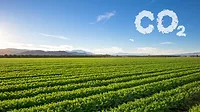Underground Carbon Sequestration Is Subject of New Study
The Awwa Research Foundation (AwwaRF) has announced a new study to investigate the potential effect of underground carbon sequestration on ground water resources.
Currently undergoing examination as a method for reducing greenhouse gas emissions, carbon sequestration entails separating carbon dioxide (CO2) from other emissions, and injecting it into deep, underground natural storage areas such as oil and gas reservoirs, saline aquifers or coal seams. Greenhouse gas emissions are a major contributor to global climate change.
The AwwaRF-sponsored project is timed to be funded before publication this summer by the U.S. Environmental Protection Agency of draft proposed regulations for a related rule. The study will look specifically at the potential impacts that carbon sequestration may have on underground water sources. The project is part of AwwaRF’s Rapid Response Research Program, a mechanism through which AwwaRF responds quickly to urgent, immediate or unforeseen research needs of the drinking water community.
“Previous and ongoing research on carbon seques-tration largely fo- cuses on long-term efficiency for containing carbon emissions, without consideration of potential impacts on the water supply,” says Robert Renner, AwwaRF executive director. “CO2 injected into underground formations could leak into overlying water supplies, with associated implications for ground water quality, or it may displace fresh water with saline water in aquifers. It’s very important for carbon sequestration practitioners and regulators to consider potential impacts on ground water supplies as the technology moves forward.”
Currently undergoing examination as a method for reducing greenhouse gas emissions, carbon sequestration entails separating carbon dioxide (CO2) from other emissions, and injecting it into deep, underground natural storage areas such as oil and gas reservoirs, saline aquifers or coal seams. Greenhouse gas emissions are a major contributor to global climate change.
The AwwaRF-sponsored project is timed to be funded before publication this summer by the U.S. Environmental Protection Agency of draft proposed regulations for a related rule. The study will look specifically at the potential impacts that carbon sequestration may have on underground water sources. The project is part of AwwaRF’s Rapid Response Research Program, a mechanism through which AwwaRF responds quickly to urgent, immediate or unforeseen research needs of the drinking water community.
“Previous and ongoing research on carbon seques-tration largely fo- cuses on long-term efficiency for containing carbon emissions, without consideration of potential impacts on the water supply,” says Robert Renner, AwwaRF executive director. “CO2 injected into underground formations could leak into overlying water supplies, with associated implications for ground water quality, or it may displace fresh water with saline water in aquifers. It’s very important for carbon sequestration practitioners and regulators to consider potential impacts on ground water supplies as the technology moves forward.”
Looking for a reprint of this article?
From high-res PDFs to custom plaques, order your copy today!





